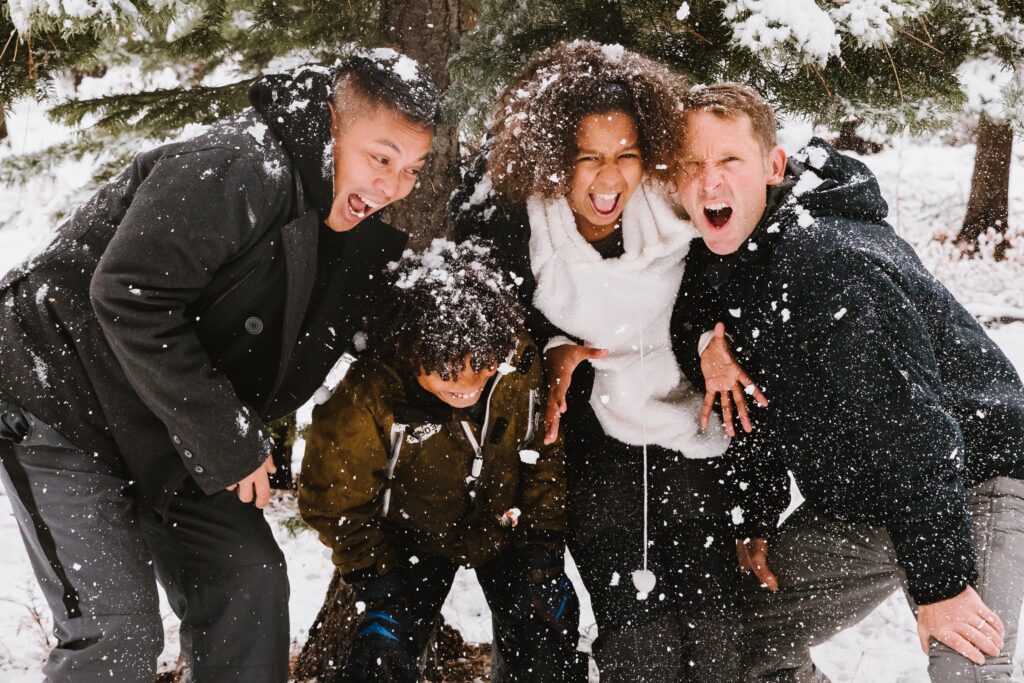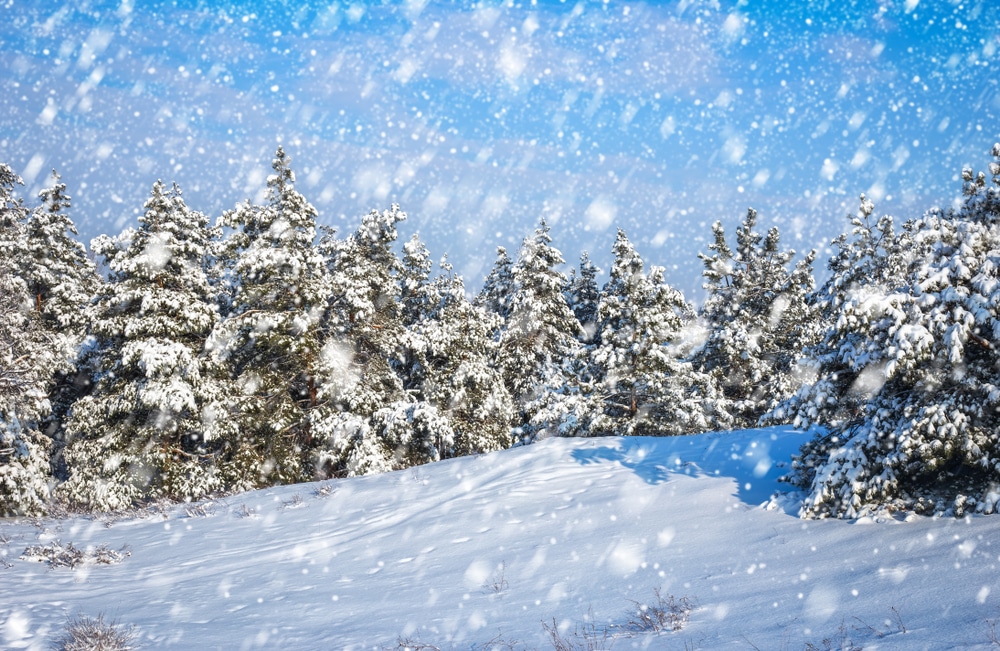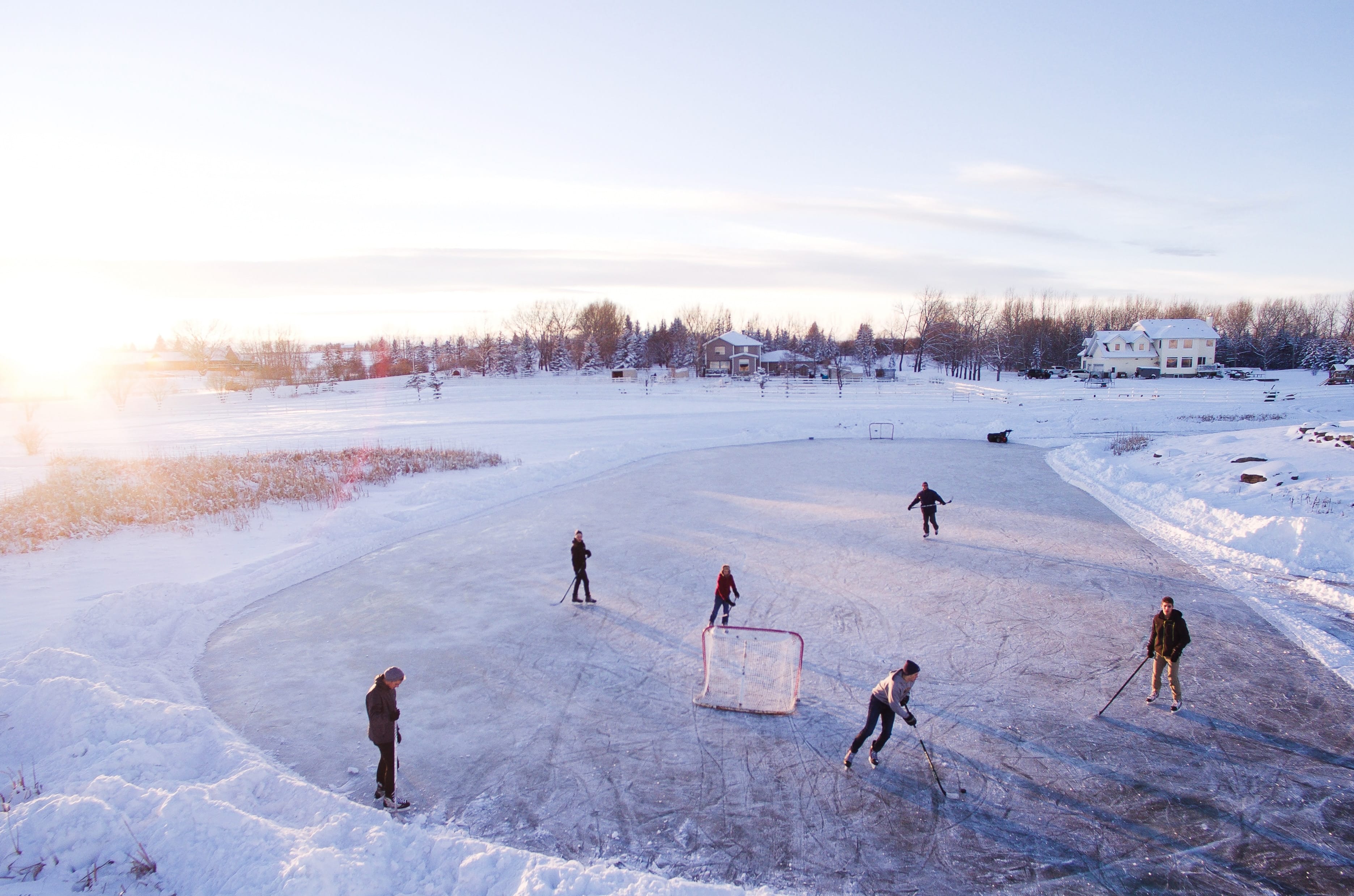
140+ Winter Vocabulary Terms
Baby, it’s cold outside.
While snow and winter holidays are fun, you may also hear people talking (and complaining!) about the cold weather.
Sometimes, this can be confusing—especially if there’s slang involved.
Wintertime definitely has its own unique vocabulary, phrases and idioms.
In this post, we’re covering over 140 winter terms, from weather and activities to holidays and more. Keep reading to learn all of the essential English winter vocabulary to get you through until spring.
Contents
- Winter Weather and Nature Terms
- Winter Objects and Tools
- Winter Clothes
- Winter Activities
- Winter Food and Drinks
- Winter Holidays and Traditions
- Cold Weather Sayings and Idioms
- And One More Thing...
Download: This blog post is available as a convenient and portable PDF that you can take anywhere. Click here to get a copy. (Download)
Winter Weather and Nature Terms
There are many terms for winter weather, and especially for the different types of winter storms. Take a look:
- Avalanche — snow, ice and rocks that fall quickly and suddenly down a mountain
- Black ice — a thin, nearly invisible ice layer on roads that is extremely slippery and dangerous
- Blanket of snow — when the ground and other objects are completely covered by a layer of snow
- Blizzard — storm with lots of snow and strong winds
- Driving ban — official, temporary rule against driving due to weather conditions
- Evergreen trees — trees like pine, fur and spruce that keep their green color all year, even in winter
- Freezing rain — rain that freezes on the ground or other objects, creating ice
- Frost — ice crystals that form on surfaces due to freezing temperatures
- Frostbite — injury caused by freezing of skin and tissues
- Glacier — a very large block of ice found in northern parts of the world and formed by packed snow over time
- Hail — frozen rain that falls from the sky as chunks of ice
- Ice storm — weather event with freezing rain causing ice buildup
- Nor’easter — powerful storm affecting the northeastern U.S. with strong winds and heavy snow or rain
- Polar vortex — large area of low pressure and cold air that causes extremely low temperatures
- Salt / Sand the roads — spreading salt or sand on roads to melt ice or make the road easier to drive on
- Sleet — a mixture of snow and rain
- Slush —wet, messy snow on the ground, usually caused by sleet
- Snow squall — intense, brief snowstorm with gusty winds
- Snowblind — not being able to see when the sun shines on white snow
- Snowdrift — mound of snow formed by the wind
- Snowflakes — unique ice crystals that fall as snow
- State of emergency — government declaration allowing for emergency actions and resources; people should usually remain at home
- Snowed in — unable to leave a building or place because snow is blocking the way
- Thaw — the process of snow or ice melting because of warmer temperatures
- Thundersnow — thunder and lightning occurring during a snowstorm
- Whiteout — reduced visibility due to blowing snow; can only see white outside
- Wind chill — very cold air that makes the temperature feel colder than it really is
- Winter wonderland — a beautiful scene of fresh snow covering the landscape
Example sentences:
“The town looks so pretty with a fresh blanket of snow in the morning.”
“Look outside! There’s frost on everything. It looks magical!”
“Don’t leave for work yet. The city government will salt the roads soon so it will be safer to drive.”
“Even though the temperature is 20 degrees, the wind chill makes it feel like -5!”
“Last week we had a winter wonderland. This week it’s Snowmageddon!”
(Snowmaggedon is a funny word for extreme, heavy snowfall that combines “snow” and “Armageddon,” which means “the end of the world”)
Winter Objects and Tools
With all of the special winter weather comes special winter tools and objects for dealing with that weather. Here are useful words to know:
- Blankets — thick, warm covers for cold weather, used on a bed or couch
- Fireplace — a place for containing and maintaining a fire for indoor heating
- Generator — a machine that helps power electricity
- Hand warmers — small packets that create heat for warming hands in cold weather
- Icicles — long, pointed ice formations that hang from surfaces, formed by frozen water
- Ice scraper — a tool used to remove ice from vehicle windows and surfaces
- Ice skates — footwear with metal blades for gliding on ice, used for ice skating
- Skis — long, narrow and flat equipment worn on boots to glide over snow, one for each foot
- Sled — a small piece of wood, plastic or metal used to slide across snow, usually down a hill
- Sleigh — a vehicle with a seating area used for traveling over snow or ice, often pulled by horses or dogs
- Snowball — a round ball of snow, often used for snowball fights or building snow structures
- Snowman — a figure made of snow, typically consisting of three stacked snowballs with accessories like sticks, stones and carrots to create a face and arms
- Snowshoes — flat objects attached to the bottom of shoes or boots to make walking on snow easier
- Snow blower — a machine used to clear snow from larger areas like driveways and walkways
- Snow chains — chains put on the tires of vehicles to make driving in snow and ice easier and safer
- Snow globe — a decorative object containing water, snow-like particles and a scene or figure inside a sealed glass dome
- Snow plow — a special vehicle that clears snow from roads or large surfaces
- Snow shovel — a tool for clearing snow from driveways, paths and sidewalks
Example sentences:
“If we lose power during the storm, the generator will turn on immediately.”
“The car isn’t buried by snow, but I do need to use the ice scraper and scrape the windows today.”
“My sister wants to take a sleigh ride in the park tonight.”
“His dad went on a work trip and brought home snow globes for each of the children.”
“We can’t go anywhere yet. We have to wait for the snow plow to clear the streets.”
Winter Clothes
If you plan on having fun outside during winter, you need to wear clothing that keeps you warm, such as:
- Beanie — close-fitting hat, typically made of knit material
- Ear muffs — soft coverings for the ears connected with a band across the head
- Fleece — a soft, warm fabric similar to a sheep’s wool; used for lightweight winter clothes
- Gloves / Mittens — hand coverings for cold protection; gloves have individual finger slots and mittens do not
- Headband — a band of fabric worn around the head to protect the ears from cold
- Leggings / Tights — thin pants usually worn for extra protection against cold; may have fleece on the inside
- Parka — hooded, thick jacket for extreme cold, often waterproof or water-resistant
- Scarf — long fabric worn around the neck for warmth and protection from wind chill
- Shawl — a wrap-around, blanket-like piece of clothing used for warmth and style
- Snow boots — thick, waterproof shoes for protection against cold and snowy weather
- Snow pants — thick, waterproof pants for extreme cold or snow activities
- Snowsuit — a one-piece outfit that combines a jacket and trousers for snow protection
- Sweater — knitted, long-sleeve shirt for additional warmth
- Thermal socks — special thick socks for warmth
- Thermal underwear — a pants-like layer worn underneath clothing for extra warmth; also called long underwear
- Vest — a close-fitting, sleeveless piece of clothing worn over a shirt
- Winter coat — a heavy, thick jacket designed for cold weather
Example sentences:
“I like your beanie! It looks very warm, and it’s cute.”
“It’s so cold today that I’m going to wear leggings underneath my pants.”
“Don’t forget to wear a scarf when you go sledding to keep your neck warm.”
“My friend made me a sweater to wear to our holiday party.”
“I need a new winter coat. This one isn’t warm enough.”
Winter Activities
Winter is not just about snowstorms and freezing cold temperatures. There are many winter activities that are fun to do with friends and family!
- Caroling — singing Christmas songs; in the past, carolers would travel from house to house, singing outside
- Curling — team sport on ice, sliding stones towards a target area, using brooms to control the stone’s path
- Dog sledding — traveling on snow with a team of dogs pulling a sled or sleigh
- Hockey — fast-paced sport on ice; teams score goals by hitting a puck into the opposing team’s net
- Ice climbing — climbing frozen waterfalls or icy rocks with special equipment
- Ice fishing — fishing in frozen lakes or ponds through holes cut in the ice
- Ice skating — gliding on ice using ice skates, often on rinks or frozen lakes
- Skiing — sliding on snow using skis, either downhill or across flat terrain
- Sledding — riding down snow-covered hills on a sled, toboggan or snow tube
- Snowball fight — a playful fight where people throw snowballs at each other
- Snowboarding — riding a single board on snow; similar to skiing but with both feet attached to one shorter board
- Snowmobiling — riding motorized vehicles designed for travel on snow
- Snowshoeing — walking or hiking over snow using snowshoes
- Winter camping — camping in snowy conditions with special gear for cold temperatures
Example sentences:
“Hockey is a fun sport to play and watch. The players wear ice skates and hit a puck into a net with a hockey stick to score goals.”
“I like to watch ice skating during the winter Olympic games. The skaters are so graceful.”
“Many people like to go skiing or snowboarding in the mountains, but I’m too scared!”
“Every winter, my family and I have a giant snowball fight. My sister is good at making snowballs, and I’m good at throwing them!”
Winter Food and Drinks
Here are common meals and beverages enjoyed during wintertime:
- Apple cider — non-alcoholic beverage made from pressed apples, often served warm and spiced with cinnamon
- Baileys Irish Cream — creamy liqueur often added to hot drinks like coffee or hot chocolate for a cozy winter treat
- Baked apples — apples stuffed with cinnamon, sugar and sometimes nuts, baked until tender and served warm
- Candy canes — striped, peppermint-flavored candy, often seen during the holiday season
- Casserole — a baked dish typically containing meats, vegetables and cheese in a single pan
- Chai — spiced tea blend made with black tea, milk and various spices, such as cinnamon, cardamom and cloves
- Chili — spicy stew made with ground meat, beans, tomatoes and chili peppers
- Eggnog — a creamy, rich drink made with eggs, milk and sugar, often spiked with rum or bourbon
- Gingerbread — a sweet and spicy cake or cookie flavored with ginger, cinnamon, nutmeg and molasses; sometimes built into decorated gingerbread houses
- Hot chocolate — a warm, comforting drink made from cocoa powder, milk or water and sometimes sugar
- Hot toddy — soothing drink made with whiskey, honey, lemon and hot water, believed to help with colds and sore throats
- Macaroni and cheese — comforting dish made with pasta and melted cheese sauce, often baked for a crispy topping
- Mulled wine — red wine heated with spices like cinnamon, cloves and orange peel
- Peppermint — a specific type of mint that’s popular during winter, often added to candy or hot chocolate
- Pot roast — slow-cooked dish made with braised beef and vegetables
- Pumpkin pie — dessert made with spiced pumpkin filling in a pastry crust, often enjoyed during fall and winter holidays
- Soup / Stew — hearty, warming dishes made by simmering vegetables, meats or beans in flavorful broth
- Spiked cider — warm apple cider mixed with rum, brandy or whiskey
Example sentences:
“I like putting candy canes in my hot chocolate for a minty taste.”
“My mom makes the best eggnog. She uses rum and puts a little nutmeg spice on top.”
“We make a pot roast on the first day of winter every year to keep us warm and full.”
“My favorite winter dessert is pumpkin pie with vanilla ice cream on top.”
Winter Holidays and Traditions
Many cultures have winter holidays. Here are some of the most well-known ones, as well as special traditions and important terms for each.
Hanukkah
This winter holiday is celebrated by Jewish people for eight days in November or December. The dates change every year based on the lunar (moon) cycle.
It’s a time when families come together to remember a story from a long time ago when a small amount of oil lasted for eight days in a temple’s lamp, even though it was only enough for one day of light.
Important terms:
- Dreidel — a four-sided spinning top used in a traditional holiday game
- Gelt — chocolate coins, often wrapped in gold or silver foil
- Latkes — potato pancakes fried in oil
- Menorah — a special candleholder with nine branches; the central candle is used to light one additional candle each night of the holiday
Saint Nicholas Day
Saint Nicholas Day is celebrated on December 6th in many European countries.
Saint Nicholas was known for helping others, especially children and those in need. On this day, children put their shoes out overnight, hoping to find little gifts or treats the next morning.
Important terms:
- Good deeds — being nice and giving to charity are extra important on this holiday
- Krampus — this figure might punish naughty (bad) children while Saint Nicholas rewards the good ones
- Saint Nicholas cookies — cookies in the shape of Saint Nicholas
Christmas
Christmas is celebrated on December 25th, and Christmas Eve is often acknowledged the day before, on the 24th. People celebrate by decorating Christmas trees and giving presents.
For Christians, it’s a time to remember the story of the birth of Jesus Christ, but many people who are not religious also celebrate Christmas.
Important terms:
- Carols — traditional songs often sung in churches, homes and public places
- Christmas tree — an evergreen tree decorated with lights, ornaments and a star or angel on top; gifts are placed under the tree
- Santa Claus — a folklore figure said to deliver gifts to good children on the night of Christmas Eve
- Stockings — long, decorative songs hung on fireplaces or walls, usually filled with small gifts or treats
- Wreath — branches, berries, ribbons and other decorations arranged in a circle, often hung on front doors
Kwanzaa
This African winter holiday lasts for seven days, from December 26th to January 1st.
Each day, families talk about different values, like unity, creativity and purpose. They light candles, share stories, eat special foods and celebrate by singing and dancing.
Important terms:
- Kinara — a special candleholder with seven branches; three candles are red, three are green and one is black
- The Seven Principles — these are unity, self-determination, collective responsibility, cooperation, purpose, creativity and faith; also called Nguzo Saba
- The Unity Cup — a cup that represents family and community, used for pouring and sharing drinks
New Year’s
New Year’s Eve is December 31st, and New Year’s Day is January 1st. It’s when we say goodbye to the old year and welcome the new one.
On New Year’s Eve, people often celebrate with a big party. On New Year’s Day, everyone starts fresh. There are many different New Year’s traditions around the world.
Important terms:
- Countdown — counting backwards (usually from 10 to one) at midnight to welcome in the new year
- Fireworks — loud, colorful explosions in the sky
- Midnight kiss — a kiss given at midnight on New Year’s Eve to start the year in a positive way
- New Year’s Ball Drop — a famous tradition in Times Square of New York City, where a large ball descends down a pole as part of the countdown to midnight
- Resolution — a personal goal made at the beginning of the year
Lunar New Year
Like Hanukkah, this holiday follows the lunar calendar. The date changes every year, but Lunar New Year usually falls towards the end of winter, in January or February.
Lunar New Year is celebrated in many Asian countries, and people celebrate for about two weeks. For good luck, families decorate their homes with red and gold and engage in other special traditions.
Important terms:
- Chinese zodiac — a cycle of 12 animals, each representing a year and its characteristics
- Dragon dance — performed by a team of dancers in a dragon costume to bring good luck; there are also lion dances
- Firecrackers — small explosives, used to scare away evil spirits
- Red envelopes — these contain money and are given as gifts, representing good luck and prosperity
Cold Weather Sayings and Idioms
When the temperature drops, people like to use all sorts of words to describe how cold it is.
For milder cold, you can say the weather is frosty or nippy . If it’s really cold, you can use words like bone-chilling and frigid .
You may hear people use the following phrases to discuss how cold they feel:
- “I’m turning into an icicle.”
- “I’m freezing my butt off.
- “I can’t feel my toes.”
- “I want to hibernate until spring.” (Like bears do)
That last one means the person wants to stay inside until it’s warm again!
There are also plenty of idioms related to cold weather:
- Be on thin ice
— do something risky that might get you in trouble
“After not showing up for work, Mark is on thin ice with his boss.” - Break the ice
— start a conversation to get to know someone or make a social situation more comfortable
“We had a list of questions to ask in class to help us break the ice with our new partners.” - Get cold feet — to be scared enough to not do something as planned
- Give the cold shoulder
— to act unfriendly or to ignore someone
“She gave me the cold shoulder the day after I embarrassed her at work.” - Have a snowball’s chance in hell
— have no chance of happening
“I told my friend Mike that he has a snowball’s chance in hell of dating his favorite celebrity.” - “Jake got cold feet and left his own wedding!”
- Leave someone out in the cold
— to not involve someone or keep them out of group situation
“My boss left me out in the cold when deciding on the new project with the other managers.” - Put a project on ice
— stop working on the project for a short time
“Let’s put the marketing project on ice for now.”
As you probably know from learning about idioms, the meanings of these phrases often cannot be understood from the words on their own. Idioms and sayings can be very confusing.
In fact, many of the winter idioms we just went over can be used during any time of the year, even if it’s not cold outside. To better understand when and how to use these phrases, you can use a program like FluentU to hear them used in real English videos.
FluentU takes authentic videos—like music videos, movie trailers, news and inspiring talks—and turns them into personalized language learning lessons.
You can try FluentU for free for 2 weeks. Check out the website or download the iOS app or Android app.
P.S. Click here to take advantage of our current sale! (Expires at the end of this month.)

Now that you have learned a lot of winter vocabulary terms, try to use them in your conversations and messages.
You can complain about the weather just like native speakers do. You can break the ice with co-workers or the cute person next to you at the bar. Perhaps you will find someone you wouldn’t mind being snowed in with!
Download: This blog post is available as a convenient and portable PDF that you can take anywhere. Click here to get a copy. (Download)
And One More Thing...
If you like learning English through movies and online media, you should also check out FluentU. FluentU lets you learn English from popular talk shows, catchy music videos and funny commercials, as you can see here:
The FluentU app and website makes it really easy to watch English videos. There are captions that are interactive. That means you can tap on any word to see an image, definition, and useful examples.
For example, when you tap on the word "searching," you see this:
Learn all the vocabulary in any video with quizzes. Swipe left or right to see more examples for the word you’re learning.

FluentU helps you learn fast with useful questions and multiple examples. Learn more.
The best part? FluentU remembers the vocabulary that you’re learning. It gives you extra practice with difficult words—and reminds you when it’s time to review what you’ve learned. You have a truly personalized experience.
Start using the FluentU website on your computer or tablet or, better yet, download the FluentU app from the iTunes or Google Play store. Click here to take advantage of our current sale! (Expires at the end of this month.)























